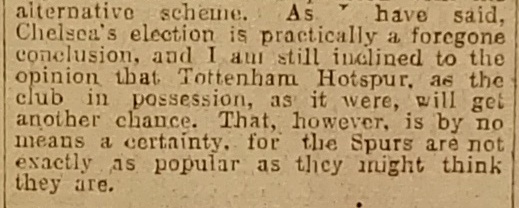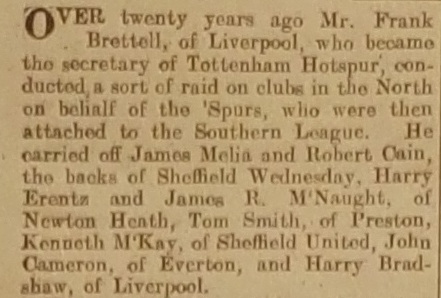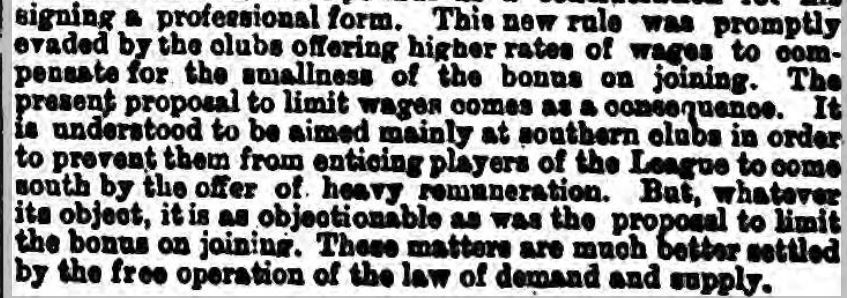Why did Tottenham poll so few votes in 1919?
If you’re not already aware, following the end of World War One the members of the Football League decided to increase the size of both the First Division and Second Division by two teams. At a meeting held on 10 March 1919, Chelsea were unanimously elected back into the top flight as it was felt that they had been unjustly relegated due to an incident of match fixing between Liverpool and Manchester United players.
The other place was contested between Arsenal, Barnsley, Birmingham, Hull City, Nottingham Forest, Tottenham Hotspur and Wolverhampton Wanderers. A vote was held in which all of the incumbent members of the Football League had one vote, along with John McKenna, president of the league. This was the same method that had been used each time the top division had been extended in the past, the only difference being that, previously, each member had two votes as two teams were elected.
In past elections, the two teams that had been relegated to the Second Division the previous season were both elected back into the First Division. This time, however, it didn’t happen. Tottenham had been relegated at the end of 1914-15 after which the Football League had closed down due to the war. For some reason, they were not looked upon as favourably as The Arsenal who polled 18 votes to Tottenham’s eight. Many years later it was, without foundation, implied that The Arsenal chairman Sir Henry Norris had bribed or coerced other club chairmen to vote for The Arsenal rather than Tottenham.
Over the past few years we’ve written about this meeting and the events leading up to it which have been incorrectly recorded, and then given the true account. We’ve also written an article that shows that Tottenham were not particularly popular with the members of the Football League and the Southern League which may have gone some way to explaining why they polled so few votes in 1919. We have now come across another possible reason for their lack of support amongst the Football League teams based in the Midlands and the North of England.
The Manchester Evening Chronicle gave an indication of this two days before the meeting:

Manchester Evening Chronicle 8 March 1919
Then, two days after the meeting, they explained further:

Manchester Evening Chronicle 12 March 1919
Now, this may seem relatively innocuous: just one team having a major push to strengthen its team. Today we wouldn’t find this unusual following the takeover of a team by a rich benefactor. However, in the late 1890s it wasn’t that simple. At the time, the Football League and the Southern League, of which Tottenham was a member, were rival leagues with different rules. When players were transferred between Southern League teams there were no transfer fees paid. The same was true for players who were transferred between a Southern League team and a Football League team – effectively free transfers. Players transferred between Football League teams could incur a fee if the selling club wanted to.
Also, there was no maximum wage in either league at the time.
This meant a fairly wealthy Southern League team such as Tottenham could entice players from Football League teams knowing that they could pay them a much higher wage as it would be subsidised by the fact that they didn’t have to pay a transfer fee. For example, if a player was on £4 per week at a Football League team and had a £400 transfer fee value, a Southern League team could offer him £6 per week as they wouldn’t have to pay a transfer fee that another Football League team would have to pay if they bought him.
Between 1897 and 1900, Tottenham Hotspur brought in at least 14 players from Football League teams, for which the Football League teams received no transfer fee.
| Player | Signed from | Year |
| Jack Jones | Sheffield United | 1897 |
| Tom Smith | Preston | 1897 |
| Harry Erentz | Newton Heath | 1898 |
| John Cameron | Everton | 1898 |
| Bob Cain | Sheffield United | 1898 |
| Jimmy Melia | The Wednesday | 1898 |
| James McNaught | Newton Heath | 1898 |
| Kenny McKay | Sheffield United | 1898 |
| Harry Bradshaw | Northwich Victoria | 1898 |
| George Clawley | Stoke | 1899 |
| Sandy Tait | Preston | 1899 |
| Tom Morris | Gainsborough Trinity | 1899 |
| Ted Hughes | Everton | 1899 |
| Jack Kirwan | Everton | 1899 |
N.B. By 1919, Northwich Victoria and Gainsborough Trinity had left the Football League
It’s not hard to see why the Football League teams were not happy with this, having their prized assets taken from them with no compensation paid which they could use to replace them.
In 1900 the Football Association agreed to introduce a maximum wage of £4 per week for players registered with Football League and Southern League teams, and performance bonuses were also stopped. On 9 May 1900 The Sporting Life stated that this was to prevent Southern League teams from enticing players from Football League teams with higher wages. The maximum wage was implemented from the 1901-02 season.

Sporting Life 9 May 1900
As we have seen before, Henry Norris enlisted the help of Athletic News editor Jimmy Catton to help with Arsenal’s election campaign. Why did he do this? The Athletic News was based in the North of England and from the ephemera that Catton collected we know that he was incredibly close and influential with the Northern teams. At the time of the election, teams from the North and Midlands comprised 85% of the membership of the Football League. It’s not beyond the realms of fantasy to imagine that Catton spoke to the chairmen of these teams and reminded them of what Tottenham had done 20 years previously, especially as the Manchester Evening Chronicle specifically mentioned it.
And on top of this, Tottenham’s devious actions played a major part in the introduction of the maximum wage for footballers which restricted their earnings for almost 60 years. It’s no wonder that they were so unpopular.
Finally, for the historians who crave detail, it wasn’t until May 1910 that the authorities in charge of the Football League and Scottish League came to a mutual agreement with the Southern League that the transfer of players between clubs in these leagues could be subject to a fee if the selling club felt it warranted one.
Books
We’ve written a number of books covering Arsenal’s history, feel free to take a look and, if you really fancy it, purchase one or more of them.
Royal Arsenal – Champions of the South
Woolwich Arsenal 1893-1915 – The Club That Changed Football
We’ve Only Got One Song – Arsenal Terrace Songs & Chants
—————–
Don’t forget to subscribe to the blog (top right). You know it makes sense.
Or have a look at our other site: The Arsenal Collection for more Arsenal memorabilia.

A really great article, I had no idea, so now feel much more informed
Great article, well researched, great clarity to one of the most contentious issues for decades.
And the answer is what people would have known anyway.
Well done